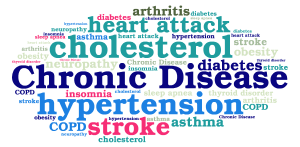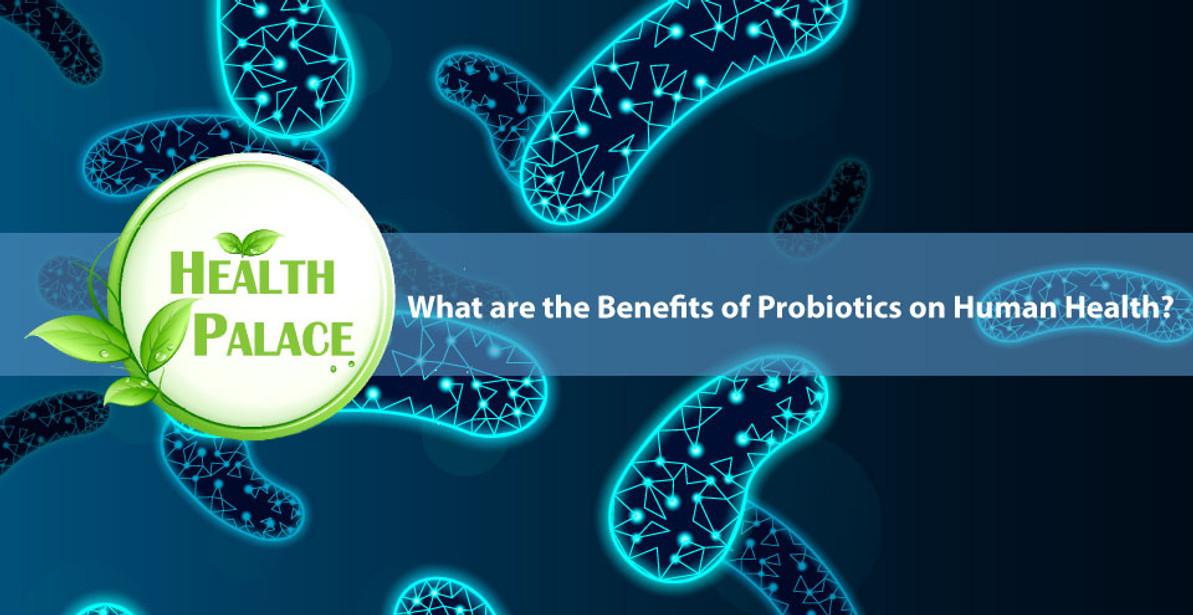What are the Benefits of Probiotics on Human Health? | Probiotic Supplements
Probiotics and their Several Health Benefits for Human
The probiotic term refers to beneficial micro-organisms which mainly found in the healthy human digestive tract. There are many different types of probiotics in the human gastrointestinal tract providing both unique and common benefits. The function of probiotics is not limited to our digestive health only. Microflora plays multiple roles in regulating the digestive tract, protecting against infectious microorganisms, protecting against toxins,

calming inflammation, providing a barrier to stop unwanted chemicals and microorganisms from harming the digestive lining and/or entering the blood, modulating the immune system, and helping to prevent and improve metabolic disease like diabetes.
An imbalanced diet and antibiotics can easily reduce the population of the microflora. An imbalanced ratio of the beneficial bacteria to the bad ones not only does affect the digestive system but also causes diseases involving other parts of the body.
Probiotics perform their functions through their biochemical communication with the intestinal cells. Generally, the human body receives chemical signals via its nervous system, hormonal system (endocrine system), and Immune system. In the human digestive tract, all these three systems are developed more than many other organs. The surface of the gastrointestinal tract is larger than the skin, consisting of about a billion nerve cells, about 75 % of our immune cells, and it works with more than 20 hormones. Therefore, the balance of probiotics directly or indirectly will affect the rest of the body's sophisticated network. Long-term studies of probiotics have shown their benefits on gastrointestinal health, such as improvement in diarrhea, constipation, colitis, Irritable bowel syndrome, and more. However, new evidence suggests that micro flora's benefits are well beyond intestinal health.
Probiotics and Cancer;
Studies support the fact that the risk of colon cancer in particular can be reduced by supplementing probiotics including Lactobacillus acidophilusand Bifidobacterium longum. These beneficial bacteria reduce the activity of the dietary carcinogens by binding to them and eventually promoting their excretion from the intestine. Also, a higher population of good bacteria will limit the growth of harmful bacteria which could potentially alter the non-cancerous molecules into carcinogens. Probiotics regulate inflammatory response during and after conditions related to infection and/or cancer.
Probiotics and Chronic Diseases;
According to multiple human-based pieces of research, supplementing with probiotics may help to protect against conditions like; cardiovascular disease, diabetes, and respiratory conditions.

Taking Probiotics helps to reduce the bad cholesterol (LDL); while, it helps to boost the HDL. Also, Probiotics reduce the absorption of cholesterol. And as a result of that, plaque formation in the arteries will be prevented.
6 weeks of supplementation with probiotics including Lactobacillus acidophilus and Bifidobacterium lactis reduces the blood sugar level, and hemoglobin A1C (an indicator of chronic high blood sugar); also, it improved insulin resistance.
Probiotics and Obesity:
The imbalanced ratio of certain bacteria in the gastrointestinal tract contributes to weight gain. In a study, bacteria called Enterobacter cloacae B29 were isolated from an obese patient's intestinal tract and transferred to the mice's gut.

On the high-fat diet, those mice with Enterobacter gained weight and become diabetic; while, the control group without this bacteria, did not demonstrate the same changes. at the beginning of the study, Enterobacter was including 35% of the bacterial population in the patient's intestinal tract.
Significant improvement in the inflammation markers, insulin resistance, blood pressure, and weight was observed just after 9 weeks of including fiber, and probiotics in the patient's diet. After 23 weeks of treatment, the population of Enterobacter (unwanted bacteria) was reduced to 1.8% and the patient's weight dropped from 174.8 kg to 123.4 kg.
A balanced microflora in our intestinal tract protects against the overpopulation of unwanted microorganisms and their negative impacts on our health.
Probiotics and Immune System:
Recent researches confirm that there is a link between gastrointestinal health and the Immune system. As was mentioned earlier about 75 % of our Immune cells are in the digestive tract, plus the digestive tract in humans produces more antibodies than the rest of the body. Probiotics communicate with the intestinal immune system via specific biochemicals.
Several human studies suggest that a strain of bifidobacteria, called BB536, can reduce the production of IgE (an Immune factor produced in allergies) resulting in relief from allergy symptoms such as runny nose, nasal congestion, and irritated eyes.
In the elderly supplementing with BB536 reduces Influenza infection and pneumonia in comparison with the placebo group.
Supplementing with different strains of Bifidobacteria or Lactobacillus for 3 to 6 months, reduces the duration and the severity of cold, flu, and respiratory infections.
Among all the beneficial bacteria some have been studied more, and more research is going on to find a particular strain of probiotic to treat or prevent diseases. Some of those well-studied stains are including:
Lactobacillus acidophilus; reduces diarrhea, improves colitis and IBS, Improves cardiovascular health, Increases HDL, helps to control blood sugar, reduces inflammation, reduces allergy symptoms, and prevents DNA damage that could cause cancer.
Lactobacillus rhamnosus; reduces diarrhea, improves colitis and IBS, reduces inflammation and cardiovascular disease, and it reduces sensitivity and allergic reactions to milk and dairy.
Lactobacillus paracasei; improves the symptoms of IBS and colitis, improves cardiovascular health, and reduces inflammation.
Bifidobacterium bifidum; reduces inflammation markers in IBS and colitis and liver.
Bifidobacterium lactis; Improves the symptoms of allergy, reduces risks of respiratory infections in the elderly, and helps to manage blood sugar.
Bifidobacterium longum; reduces diarrhea, improves symptoms of colitis and IBS, Improves cardiovascular health, Increases HDL, and prevents DNA damage.
Science has shown that long-term imbalance in intestinal microflora not only does impact digestive health but also could initiate many other chronic illnesses. Diet, lifestyle, usage of antibiotics, and some medicines contribute to this imbalance. Supplementing with probiotics protects against the imbalance.
Articles and products featured by Health Palace are collected from a variety of sources and are provided as a service by Health Palace. These newsletters, while of potential interest to readers, do not necessarily represent the opinions nor constitute the advice of Health Palace. Presented materials are only for information purposes and do not intend to treat, cure, or prevent any disease.
Reference:
1.Frick JS, Autenrieth IB. The gut microflora and its variety of roles in health and disease.Curr Top Microbiol Immunol.2013;358:273-89.
2.Ko JS. The intestinal microbiota and human disease.Korean J Gastroenterol. 2013 Aug 25;62(2):85-91..
3.Brown K, DeCoffe D, Molcan E, Gibson DL. Diet-induced dysbiosis of the intestinal microbiota and the effects on immunity and disease.Nutrients. 2012 Aug;4(8):1095-119.
4.Vyas U, Ranganathan N. Probiotics, prebiotics, and synbiotics: gut and beyond.Gastroenterol Res Pract.2012;2012:872716.
5.Roberfroid M, Gibson GR, Hoyles L, et al. Prebiotic effects: metabolic and health benefits.Br J Nutr.2010 Aug;104 Suppl 2:S1-63.
6.Guarner F, Malagelada JR. Gut flora in health and disease.Lancet. 2003 Feb 8;361(9356):512-9.
7.Kotzamanidis C, Kourelis A, Litopoulou-Tzanetaki E, Tzanetakis N, Yiangou M. Evaluation of adhesion capacity, cell surface traits and immunomodulatory activity of presumptive probiotic Lactobacillus strains.Int J Food Microbiol.2010 Jun 15;140(2-3):154-63.
8.Kumar M, Kumar A, Nagpal R, et al. Cancer-preventing attributes of probiotics: an update.Int J Food Sci Nutr.2010 Aug;61(5):473-96.
9.Backhed F, Ding H, Wang T, Hooper LV, Koh GY, Nagy Aet al. (2004). The gut microbiota as an environmental factor that regulates fat storage.Proc Natl Acad Sci USA101: 15718–15723.
10.Backhed F, Manchester JK, Semenkovich CF, Gordon JI. (2007). Mechanisms underlying the resistance to diet-induced obesity in germ-free mice. Proc Natl Acad Sci USA 104: 979–984.
11.Cani PD, Amar J, Iglesias MA, Poggi M, Knauf C, Bastelica D et al. (2007). Metabolic endotoxemia initiates obesity and insulin resistance. Diabetes56: 1761–1772.
12.de Moreno de LeBlanc A, Matar C, Perdigon G. The application of probiotics in cancer.Br J Nutr.2007 Oct;98 Suppl 1:S105-10.
13.Soltan Dallal MM, Yazdi MH, Holakuyee M, Hassan ZM, Abolhassani M, Mahdavi M.Lactobacillus caseissp.casei induced Th1 cytokine profile and natural killer cells activity in invasive ductal carcinoma bearing Bixquert Jiménez M. Treatment of irritable bowel syndrome with probiotics. An etiopathogenic approach at last?Rev Esp Enferm Dig.2009 Aug;101(8):553-64.
14.Kumar M, Nagpal R, Kumar R, et al. Cholesterol-lowering probiotics as potential biotherapeutics for metabolic diseases.Exp Diabetes Res.2012;2012:902917.
15.Mohania D, Kansal VK, Shah D, et al. Therapeutic effect of probiotic dahi on plasma, aortic, and hepatic lipid profile of hypercholesterolemic rats.J Cardiovasc Pharmacol Ther.2013 May 12.
16.Jeffery IB, O’Toole PW. Diet-microbiota interactions and their implications for healthy living.Nutrients.2013 Jan;5(1):234-52.
17.Rehman T. Role of
the gut microbiota in age-related chronic inflammation.Endocr Metab Immune Disord Drug Targets.2012 Dec;12(4):361-7
18.Kondo J, Xiao JZ, Shirahata A, et al. Modulatory effects of Bifidobacterium longum BB536 on defecation in elderly patients receiving enteral feeding.World J Gastroenterol.2013 Apr 14;19(14):2162-70
19.10. Girardin M, Seidman EG. Indications for the use of probiotics in gastrointestinal diseases.Dig Dis.2011;29(6):574-87.
20.34. Diamant M, Blaak EE, de Vos WM. Do nutrient-gut-microbiota interactions play a role in human obesity, insulin resistance and type 2 diabetes?Obes Rev.2011 Apr;12(4):272-81.
21.37. Ejtahed HS, Mohtadi-Nia J, Homayouni-Rad A, et al. Effect of probiotic yogurt containing Lactobacillus acidophilus and Bifidobacterium lactis on lipid profile in individuals with type 2 diabetes mellitus.J Dairy Sci.2011 Jul;94(7):3288-94.
Recent Posts
-
Maintain A Healthy Heart Rhythm With Integrative Medicine
Maintain A Healthy Heart Rhythm With Integrative Medicine;Usually, abnormal heart rate or arrhythmi …4th Feb 2021 -
How To Protect Against COVID-19
Coronaviruses are a large group of viruses that cause many common human and animal infections. In hu …30th Jun 2020 -
How to Prevent Gallstones from Forming? | Natural Supplements for Gallstones
How To Prevent Gallstone Formation?Gallstones are hard deposits made of cholesterol or bilirubin f …4th Mar 2020




